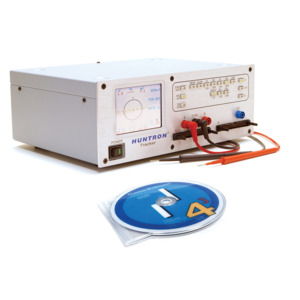
- Description
- Specifications
- Documents
99-0423 Tracker 2800S w/ Workstation SW & Scanning Functionality
Features:
- 6 voltages: 200mV, 3V, 5V, 10V, 15V, 20V
- 9 resistances: 10, 50, 100, 500 ohms / 1, 5, 10, 50 & 100 kilohms
- 6 frequencies: 20Hz, 50Hz, 60Hz, 200Hz, 500Hz & 2kHz
- Manual or use Auto Scan; Optional Software control
- Banana jacks for A/B Test channels and Common; A & B 40-pin IDC connectors for cable based scanning (i.e. interface to PCB connectors)
- Variable voltage from 0 to 10VDC; 200mA max.
Includes: Workstation SW, CD manual, power cord, test leads, MP20 probe set, mini hook test lead, footswitch and USB cable.
Highlights:
- Optional Software Control using Huntron Workstation
- Enhanced Range Selections
- Full Screen Signature Zoom
- Color Touch Screen controls
- Huntron SigAssist built-in
- Built-in DC Voltage Source for testing gated devices (i.e. SCRs, relays, etc.)
- Up to 40-pin scanning with the Tracker 2800S
The Huntron Tracker 2800S is designed to complement conventional test instruments in the debug and troubleshooting process. Using the proven power-off test method known as Analog Signature Analysis it eliminates the risk of further circuit damage, which often occurs when power is applied. The Huntron Tracker 2800S is suited for todays varied signal circuit cards where Analog and Digital are mixed together.
The Tracker 2800S features variable range parameters resulting in over 100 combinations of voltage, source resistance and frequency. The 2800S is a great off-line support tool for the automated Huntron Access Prober diagnostic systems.
The Tracker works by applying a current-limited AC signal across two points of a component. The current flow causes a vertical signature deflection, while the applied voltage causes a horizontal deflection. Together they form a unique V/I signature that represents the overall health of the device under test. Analyzing the signature can quickly determine whether the component is good, bad, or marginal.
Cable Based Scanning
The Tracker 2800S features two 40 pin IDC connectors (one per channel) where custom cable interfaces can be used to quickly scan PCB connectors as a type of infirst passin test. If signature differences are detected then you can trace the connector pin to the component level saving you troubleshooting time.
You can also use IC clips and cables to easily scan standard ICs and select SOICs. Clips are readily available from companies such as Pomona.
